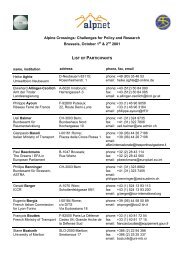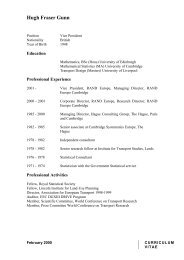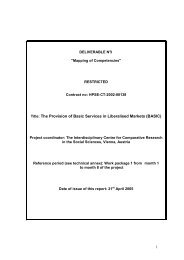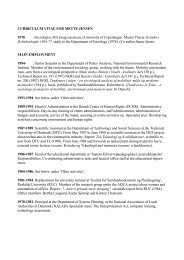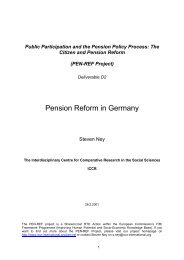The Housing Dimension of Welfare Reform - the ICCR
The Housing Dimension of Welfare Reform - the ICCR
The Housing Dimension of Welfare Reform - the ICCR
Create successful ePaper yourself
Turn your PDF publications into a flip-book with our unique Google optimized e-Paper software.
founded eight years ago. Never<strong>the</strong>less it developed constantly over <strong>the</strong><br />
years and underwent some changes in procedures.<br />
<strong>The</strong> Soziale Schiene comprises two substantially different procedures for<br />
housing provision. <strong>The</strong> first foresees <strong>the</strong> immediate supply <strong>of</strong> housing to<br />
people who are homeless or threatened by homelessness. <strong>The</strong> second<br />
provides dwellings to clients <strong>of</strong> housing programmes and social services.<br />
‘Harm reduction’ Friburg programme<br />
<strong>The</strong> ‘harm reduction’ programme <strong>of</strong> <strong>the</strong> City <strong>of</strong> Friburg operates by<br />
making methadone available to persons facing a serious and chronic drug<br />
addiction. It is part <strong>of</strong> a larger institutional strategy which ranges from<br />
providing generic support to providing support for abstinence.<br />
<strong>The</strong> programme began in 1982 as an initiative <strong>of</strong> CARITAS targeting<br />
former prisoners and drug addicts. In 1985 it was established as an<br />
autonomous foundation. In 1991 it began to defend drug addicts against<br />
discrimination. In 1995 it sited against <strong>the</strong> initiative to penalise drug<br />
addicts and later even came out in favour <strong>of</strong> <strong>the</strong> legalisation <strong>of</strong> marijuana.<br />
Despite this more ‘liberal’ attitude today, it remains catholic in<br />
orientation – <strong>the</strong> director being <strong>the</strong> same as in <strong>the</strong> beginning and a priest.<br />
<strong>The</strong> programme has experienced an impressive growth since its<br />
establishment. In 1982 it supervised three persons, today it takes care <strong>of</strong><br />
35. It is today linked to eight services and has a budget <strong>of</strong> 5,3 million<br />
CHF (as compared to 300,000 in 1982). This growth was based on <strong>the</strong><br />
ability <strong>of</strong> <strong>the</strong> programme to anticipate and react to policy changes, thus<br />
also to target potential funding possibilities (in part relying on federal<br />
sources when cantonal sources where not available and vice-versa).<br />
<strong>The</strong> programme represents in many respects a charismatic institution,<br />
centred around its leader. This has been <strong>the</strong> key to its success till now.<br />
<strong>The</strong> programme’s director has been personally very much engaged and<br />
enjoys wide legitimacy and acceptance.<br />
Dublin City Council Settlement Service<br />
In Dublin, users <strong>of</strong> <strong>the</strong> Dublin City Council Settlement Service (DCCSS),<br />
a public resettlement service for rough sleepers, were interviewed. <strong>The</strong><br />
DCCSS was established in January 2000 as one element <strong>of</strong> a new<br />
settlement strategy. In 2002, <strong>the</strong>re were six settlement <strong>of</strong>ficers and a<br />
manager working at <strong>the</strong> DCCSS. <strong>The</strong>y focus on re-housing rough<br />
sleepers and, in particular, those persons who have been trying to avoid<br />
sleeping in hostels and shelters. Between February 2000 and August<br />
2001, altoge<strong>the</strong>r 48 homeless people, predominantly men (92 per cent),<br />
had actively engaged with <strong>the</strong> DCCSS.<br />
EUROHOME-IMPACT FINAL REPORT 52



